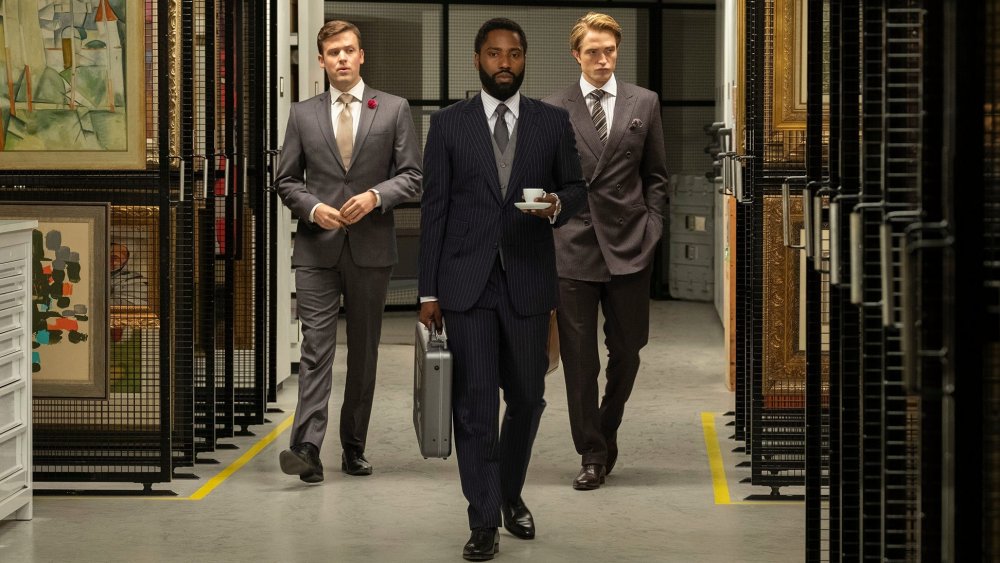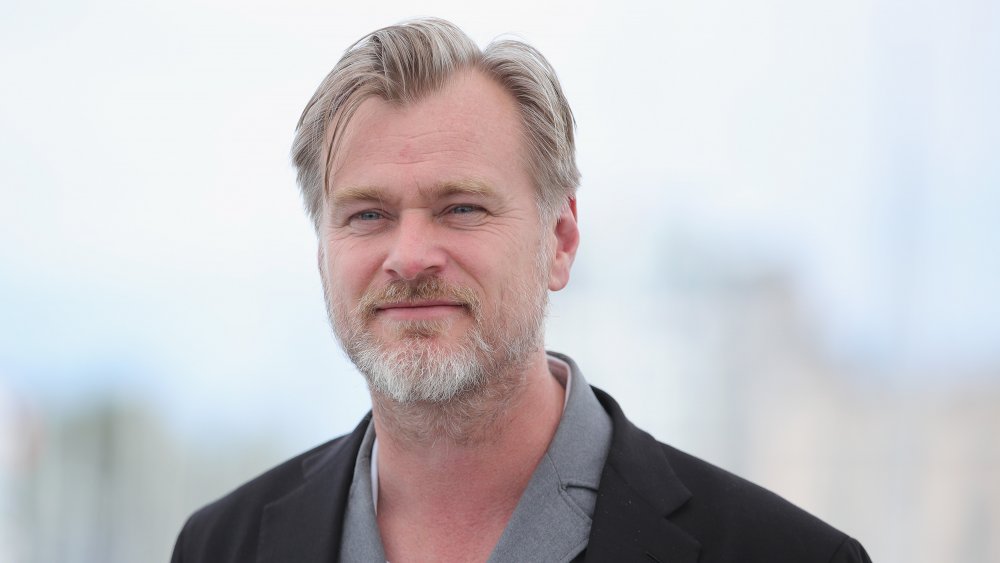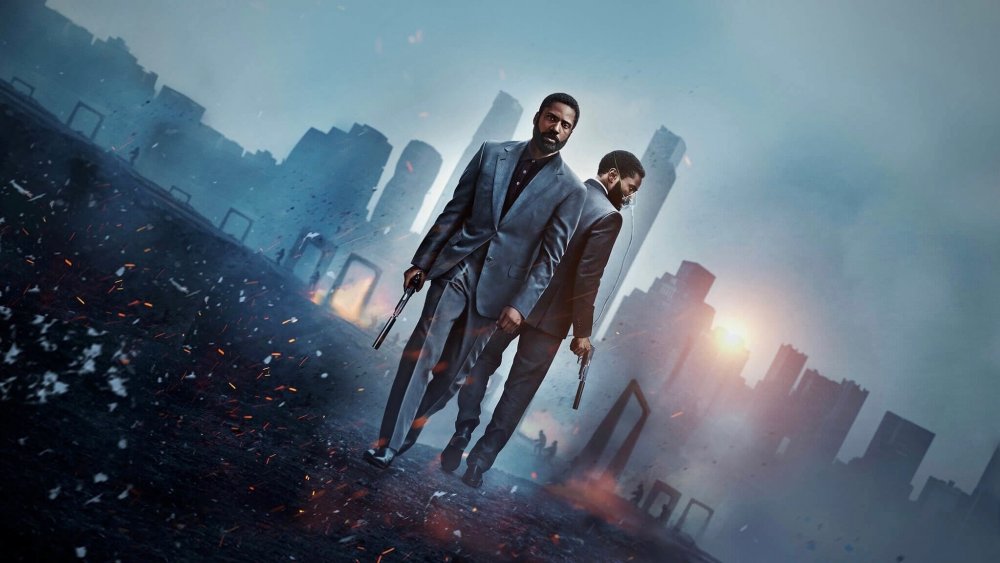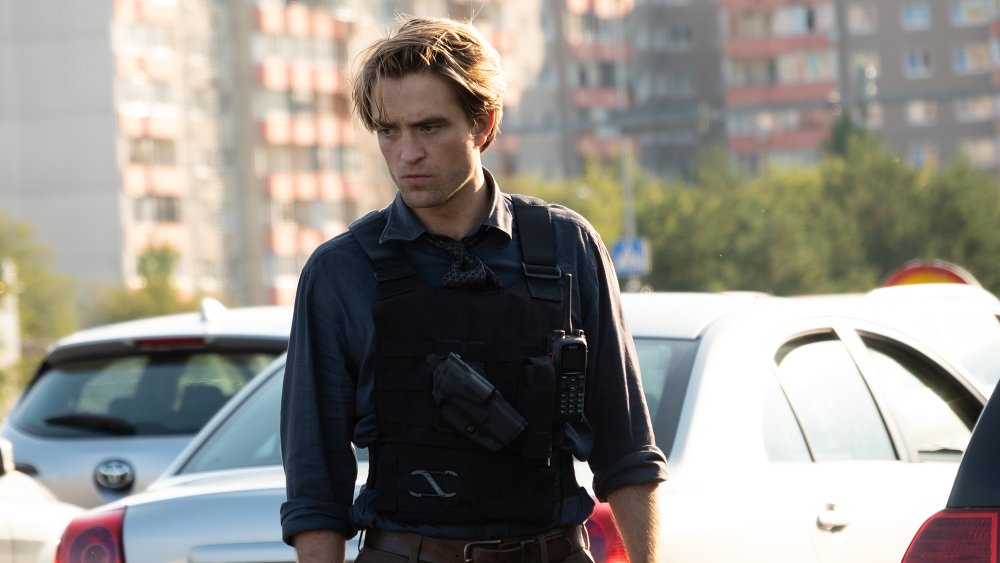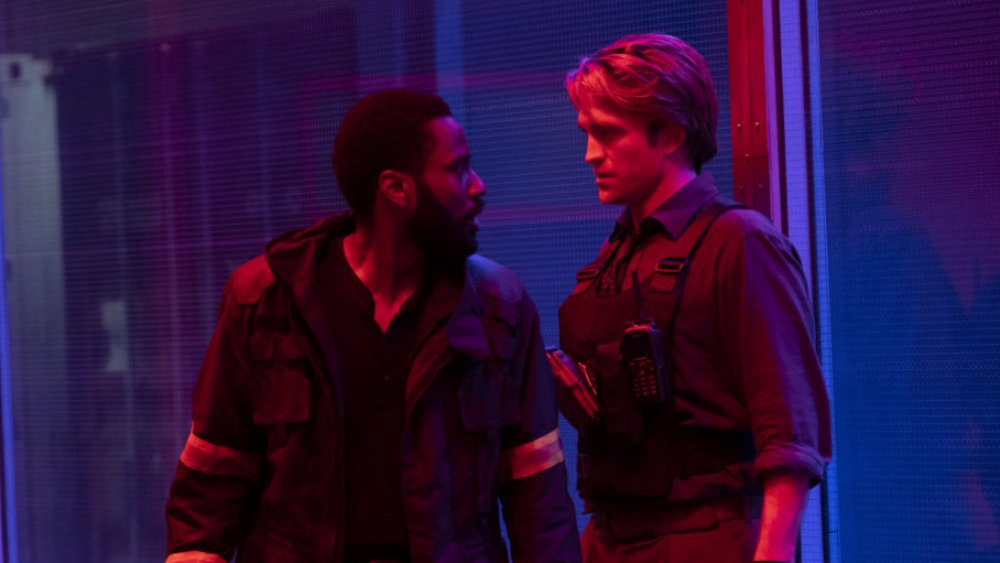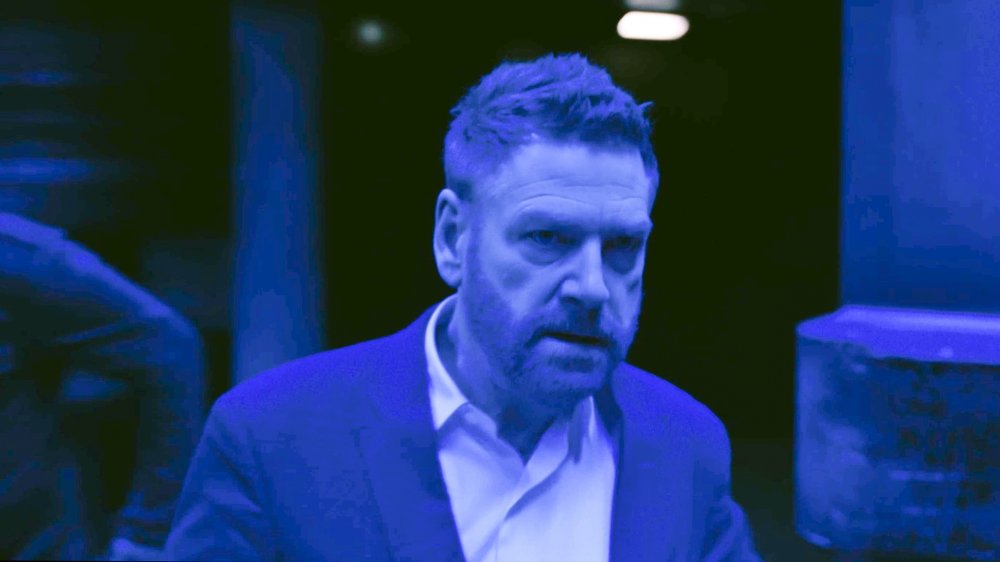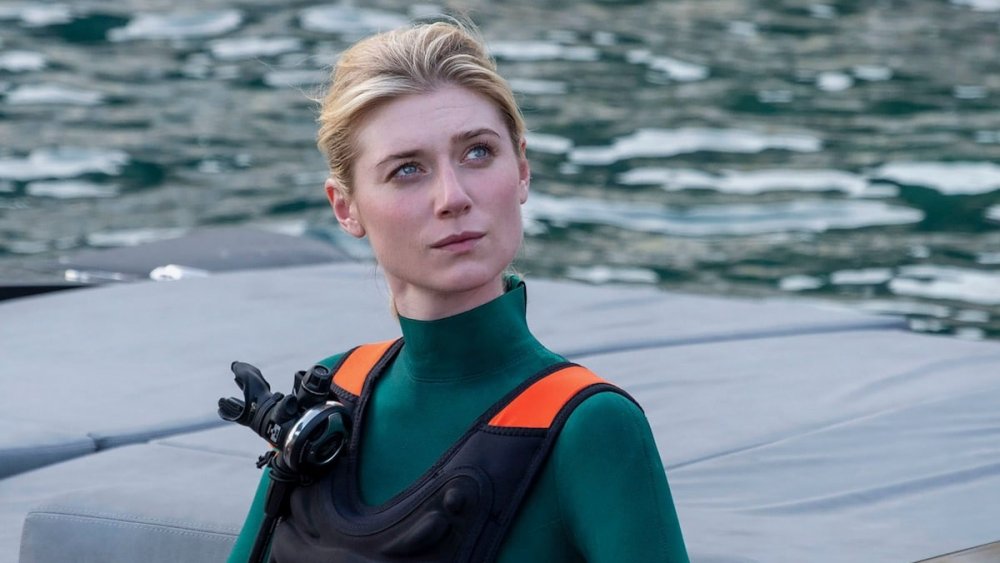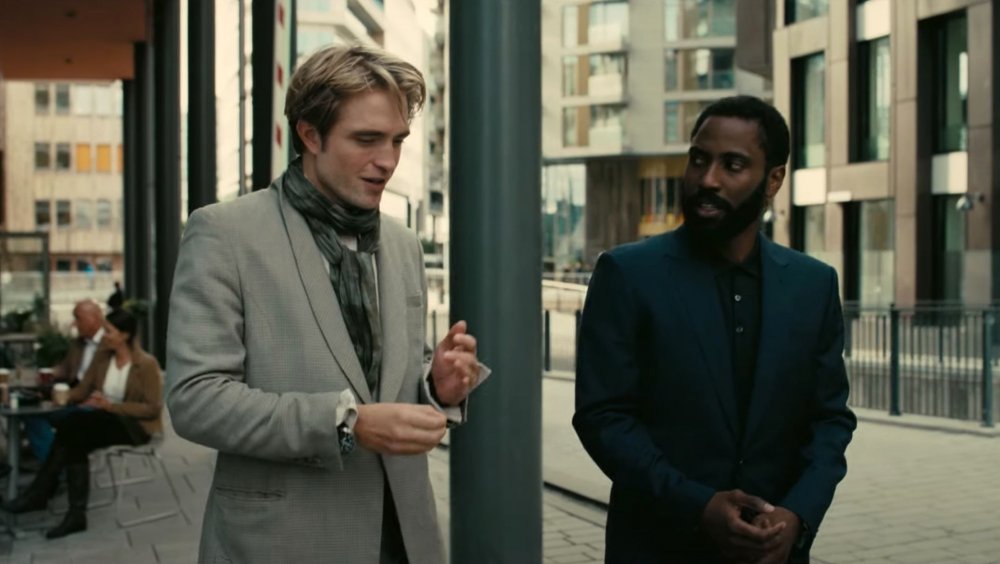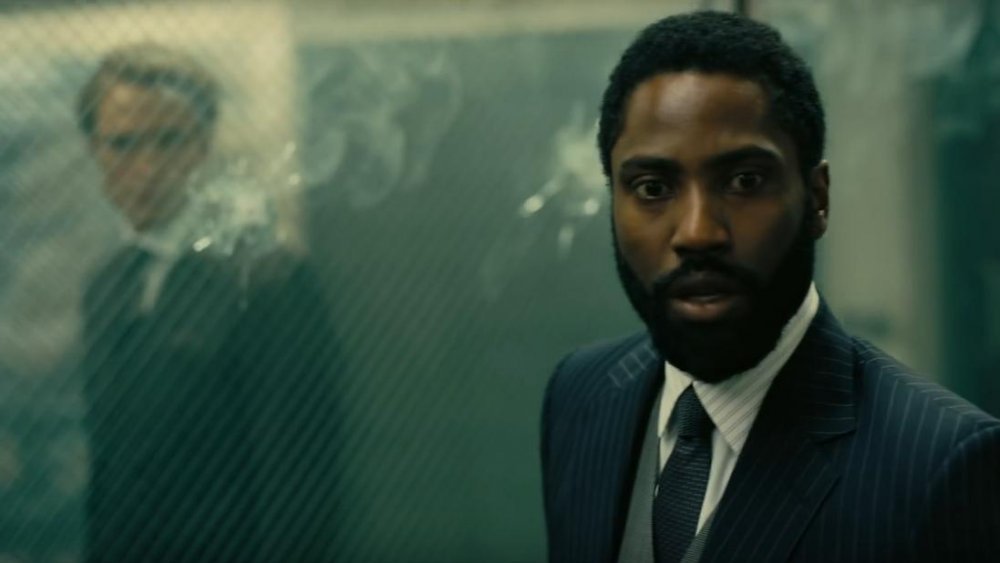The Ending Of Tenet Explained
We waited, we wondered, and we worried, but finally, it's here: Christopher Nolan's newest visual buffet, Tenet, has arrived in theaters. It's up to the fates to decide if Tenet will succeed in drawing cautious Americans back to the big screen en masse, but Warner Bros. is certainly justified in betting on the superstar director's reputation for bringing the cinematic bacon. We go to Nolan movies for specific things: head-spinning twists cascading in rapid succession, bombastic visual effects, and big questions about the nature of reality. All of these come to the fore in Tenet, but dovetail together in a rather novel statement about humanity, rather than any metaphysical examination about the universe around us. Tenet's big, flashy conceit about time — the process and effects of inversion — is also a way to actually tell a story about simple faith in friendship and trust to bear us through to an uncertain future.
Though our protagonists (Neil and the eponymous Protagonist, respectively portrayed by Robert Pattinson and John David Washington) take a beat to somewhat explain themselves at the end of the movie, the strict facts are only a part of what makes Tenet's ending what it is. The things that give it weight aren't necessarily said, but observed, and it's designed to make you sit with it after the fact and think it through. So then, let's take a look at what Tenet's ending is trying to say as it wraps up a story about fate, time, control, and belief. As you might imagine: crazy amounts of spoilers abound!
Nolan's career fascination
Time, relativity, and the malleability of individually perceived reality are enduring concepts explored in all Christopher Nolan's films, and Tenet is, in part, assembled from many little pieces of those previous works, filtered through a new perspective.
It has all the same sense of social responsibility and civic duty featured in his Batman trilogy. The reverse chronology of Memento. Dunkirk is a war drama about the indomitable human spirit tested by conflict, and that thread runs through Tenet. Interstellar and Inception both have time manipulation at the heart of their conceits, though the effects are more about relative acceleration of time into the future than Tenet's belief in its flexibility. The biggest baseline, however, is the mystification of institutions we all know exist (police, espionage, entertainment, parenthood), and elevating their purposes and the lives that live within them to make fantasies of the impossible in order to consider philosophical points about humanity and question what that means within our own lives.
The conflict, streamlined
The plot of Tenet, as you would expect of a Nolan picture at this point, has a whole lot going on, and to add to the complexity, it's presented in pieces of linear progression before rewinding or fast-forwarding to another event.
The basic idea is this: The Protagonist (John David Washington) has been recruited into a shadowy collective of people that can identify themselves by a hand sign of interlaced fingers and the word "tenet." Pieces of broken detritus are coming back through time, implying mass destruction from some kind of global conflict, and the Protagonist is trustworthy enough to assist the loose conglomeration of insiders who are trying to understand and prevent... whatever it is that's happening in the future. All the items arriving in the past are "inverted," meaning their entropy (the scientific concept of energy) is progressing thermodynamically backwards relative to the past, which is of course moving toward the future. If the balance of things and people inverting ever comes to equal the concentration of things and people that are un-inverted, spacetime will be annihilated. No pressure, right?
The Protagonist secures the assistance of a CIA attache named Neil to get him to exotic locales, meet people suspected of knowing more about "tenet," and ultimately follow that chain back to the apparent source of the inverted items: Andrei Sator, who has a mysterious ability to communicate with the future and process items and people with inversion through turnstiles, machines that may or may not be quantum-entangled. The Protagonist ultimately discovers that their MacGuffin is the Algorithm, nine physically connectable objects that encapsulate the mathematical concept by which inversion is possible. The unnamed inventor of the Algorithm made these objects and scattered them, JRPG-style, in the past to keep its secret safe, then killed herself.
Confused yet?
Neil's two-time temporal trickery
During the climax, which takes place in a former Soviet closed city, we are shown that Neil and the Protagonist are placed on opposite sides of the so-called temporal pincer movement: two combat teams, one inverted and one not, operating simultaneously in time to assist each other in acquiring the Algorithm. What you might have missed in the overall mission briefing is that Ives (Aaron Taylor-Johnson) mentions there is a turnstile on site — another machine to invert oneself. After Neil sees one Sator's eerily tall, Jaws-like henchman (Yuri Kolokolnikov) lay the tripwire and tries to warn the Protagonist by honking at him with a Humvee, he realizes that he needs to do more — he sneaks his way into the facility and passes through the enemy's turnstile just as the Protagonist and Ives arrive underneath it to try and gain control of the Algorithm, and that's why he's able to get back in the Humvee and get to the top of the artificial hill to pull Ives, the Protagonist, and the Algorithm out from the pit.
The body on the other side of the locked gate in the pit is Neil, but another Neil — we know because of the red string (which we can only assume is a reference to the Chinese concept of fate) with a washer on the end, which was shown in multiple previous scenes (in fact, it proves that Neil is the man who saved the Protagonist with the inverted bullet in the opening scene at the opera). However, we never see how that Neil ends up at the gate. This is a sacrificial move on Neil's part that occurs after we see his last scene — that's why the Protagonist tries to stop him from getting on the helicarrier and Neil tells him "what's happened, happened" and it's the "end" of their friendship for him. All of Neil's efforts are not just to ensure a future in one go, but repeatedly to maintain it for the Protagonist.
Neil's place as a friend
The movie reveals Neil in pieces: acquaintance, confidante, ally, combat buddy, and ultimately as a very old friend to the Protagonist. Looking back on the rest of the movie once you realize Neil's entire deal, it's suddenly a more emotional film — Neil appears to struggle in some scenes not to be quite too friendly, though he clearly wants to be. He knows the Protagonist loves Diet Coke, but he'll pretend to be classy by claiming he likes club soda more — knowledge that isn't the product of a dossier, but a long friendship whiled away at bars, post-mission. When the Protagonist peppers Neil with questions during the scenes in the shipping container, he's surprisingly conciliatory and almost charmed by his friend's ignorance. After all, Neil probably learned most of it from the Protagonist at some point in the future.
Neil appears literally everywhere there are gaps in the Protagonist's plan — a place he can't be, chasing an object he cannot reach, fighting an enemy that he cannot see or is overpowered by. Knowing as we do from the end of the film that Neil has been operating backwards through the Protagonist's life at this critical point in his history, that can only mean that these two are the very, very best of friends, and it takes a massive amount of trust and confidence to give someone you care about that mission, and even more courage to be the person in charge of keeping someone safe. That's why the Protagonist is immediately brought to tears realizing it — and why Neil doesn't mourn walking away to what he can probably guess is his death. The Protagonist tried to stop him from walking away because he cares about Neil, and that's all the reassurance Neil needed in the universe that his effort was worth it.
The Protagonist claims his title
When you learn that John David Washington's character is known only as the Protagonist, it might sound like a gimmick at first. But like so many things in Nolan's films, the choice is a deliberate one — and it makes a point about who the character is and where he's going in his story. Priya (Dimple Kapadia) makes a critical distinction arguing with Washington's character as the climax begins to ramp up: he is a protagonist, not the protagonist. Her point is correct in that moment — there are indeed many people all working separately and in concert to either collect the Algorithm or ensure it remains in separate pieces, and they all (including most critically here, Priya herself) consider themselves heroes in their stories.
The very end of the film, then, works to upend the definition one more time, and Washington says it himself in the back seat of the car: "We both thought I was working for you — turns out you're all working for me." Washington becoming the Protagonist occurs in that moment; it is the center of a spy's temporal (political) pincer movement that he has the wisdom to recognize as an effort constructed by his own future self and left to the providence of Neil. In achieving his task with the help of the people he trusts, he has ensured his own idealized future as well as a better outcome for the world he inhabits moment to moment, and furthermore, he's empowered himself to protect Kat within their continuum as well. That is the ultimate expression of the concept of a protagonist — a belief in the self-acquisition of our own best possibility, even when you can't immediately see it yourself, which once achieved, can save the world and guide it to better days.
Sator and control
Tenet puts a ton of effort into its first half trying to convince the audience that the Protagonist's failures are inevitable, and that Andrei Sator (Kenneth Branagh) has all the cards in his hands because of his connection across spacetime to the future allowing him to counteract their efforts. We don't know, and we never will know, who Sator was talking to. That's part of the point — all that matters is that Sator has, and is obsessed with, maintaining control. His wife, his child, his money, his business — and as it turns out, all of spacetime — can be under no one else's control but his, all to do with it as he pleases.
Just before his death, Sator and the Protagonist have a heated exchange about his plan to die and take the continuum with him, destroying all life. The Protagonist calls him selfish, possessive, all kinds of names. Sator readily agrees, comparing himself to a god, but the critical point is his admission that he has no faith or belief in anyone or anything. According to what the future has told him, the Earth is a wreck, and the idea to assemble the Algorithm is a plan to end the world as an act of mercy before it falls to what is heavily implied will be a climate change disaster. He cannot conceive of a world beyond the cruel one he envisions and insists on controlling, and the very idea that climate change, a global catastrophe, mars his personal legacy through his child means that the whole of creation has got to go with him.
Sator lucked into his position controlling the universe with a fitness tracker through happenstance, and the very job that gave him this power — mucking with radioactive materials — is likely the same one that gave him his pancreatic cancer. His sense of control comes from putting a gun to the head of everyone and everything that threatens him, so it's fitting his death is pretty ignoble and small. The Protagonist, however, is naturally different.
Kat and control
Kat (Elizabeth Debicki), Sator's estranged wife, initially appears to be an accidental casualty brought into the conflict as the Protagonist tries to worm his way closer to Sator and his operation. As part of the overarching theme of control and self-actualization, her motivation is seeing Sator dead — and getting to watch him experience even a smidgen of the terror she inflicted on him before he dies. She is kept as a gilded prisoner in the marriage because of the son she bore Andrei; people, especially his son, are possessions to him, and he tells Kat that she is free to leave if she will agree to never see her son again.
As the climax arrives, her task is to keep Sator from triggering his dead man's switch by schmoozing him on his yacht in Vietnam on the day he intends to commit suicide (thereby undoing spacetime) while the Protagonist, Neil, and a whole bunch of temporal soldiers take the fight to a Soviet closed city to acquire the Algorithm — and it's the same day Kat previously recalled having seeing a woman, who she assumed to be a mistress of Sator's, dive from the yacht. That woman was, in fact, Kat herself after Sator was killed and the Algorithm was secured; her past self saw her future self safe, sound, and free — the way she desperately wanted to be.
The Protagonist, his friends, and control
The concept of time inversion has received a lot of glitzy press as this movie stumbled into theaters in the most unprecedented summer of modern moviemaking, and that's fair enough for marketing purposes. Tenet, however, is not "about" time travel, or even necessarily just relativity. They are merely the conceits used to underline a much more basic idea: the future is always uncertain, but the way forward for the greater benefit of the masses is to trust each other and your individual abilities to seek a collective betterment. The Protagonist's mission treating time as instances, rather than a linear path, only works because he trusts Kat and Neil and others acting in good faith to do the best they can for the situation, themselves, and everything the Protagonist hopes they will accomplish. They keep information from each other as an act of love and respect — a relinquishing of control.
The Protagonist has the faith and belief Sator completely lacks — despite the fact that Neil constantly says "what's happened, happened," that only goes as far as the individual experiencing it. The collective future is always in play, if you have the ability to see outside preconceptions of any norm or concept. It's about having the courage to see it, and acting to achieve the world that reflects your values. The Protagonist kills himself at the beginning of the movie with cyanide out of this exact obligation to others. He doesn't succeed and his team dies, but this is the act that qualifies him to learn about Tenet — a value he himself will establish in the far future. It's not that the future Protagonist has done something to ensure a loop, it's a form of maintenance he performs continuously for others so that they may live. He's like a temporal Batman, basically, and while it's an allegory so huge it comes close to falling in on itself, it's meant to apply to all of us.
Splitting the Algorithm
Priya's stated interest in assembling the Algorithm was the belief that having all of it would empower the past against the future, because obviously (to her), a war was inevitable and being waged against the past. Ives is the one who initially presents the idea of splitting the Algorithm after seeming as if he will kill the other two in order to maintain its safety, and Neil and the Protagonist obviously consent to the idea, thinking it's the better plan.
So, then, we can understand that "tenet," as a secretive concept sent back through time to signal with the word and a hand sign, is a method the Protagonist creates to ferret out those who would misuse the power of inversion and the Algorithm. The dictionary definition of the word "tenet," in case you were unaware, is "a principle or belief, especially one of the main principles of a religion or philosophy." Philosophy is the key word here.
Tenet as the Protagonist conceives of it is a test, and the test is learning what you, given the power, would do with the Algorithm if you had it assembled before you. If you're motivated by control, as Priya and Sator were, you become a "loose end," and that's dangerous, because loose ends and their motivations destroy reality. Defending reality — defined in the movie by Neil as the uncertainty of existing in the moment — takes people with the principle (or tenet) of decentralizing power. No man is a god, and there is always hope for the future when people work together.
